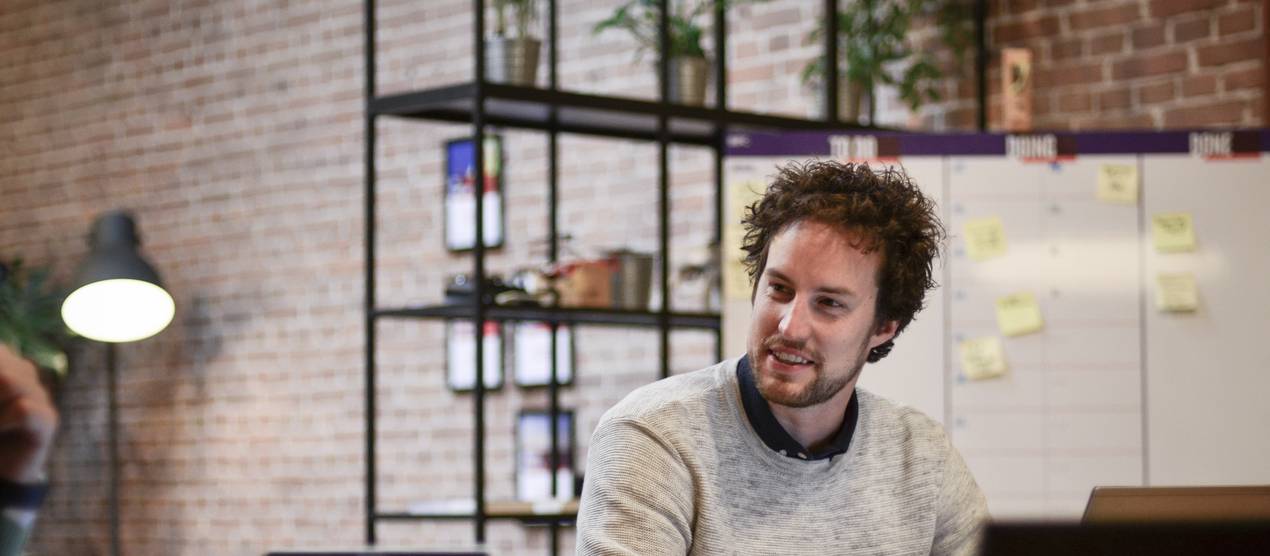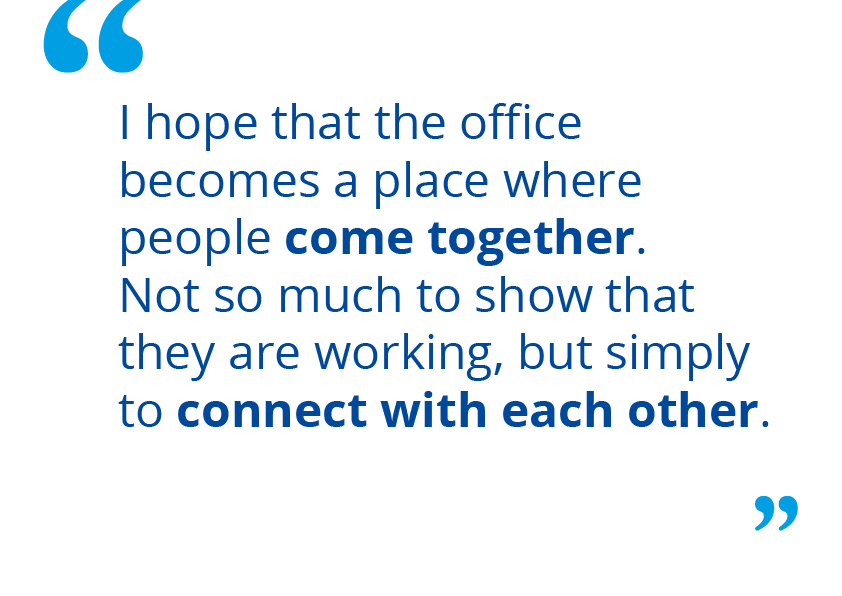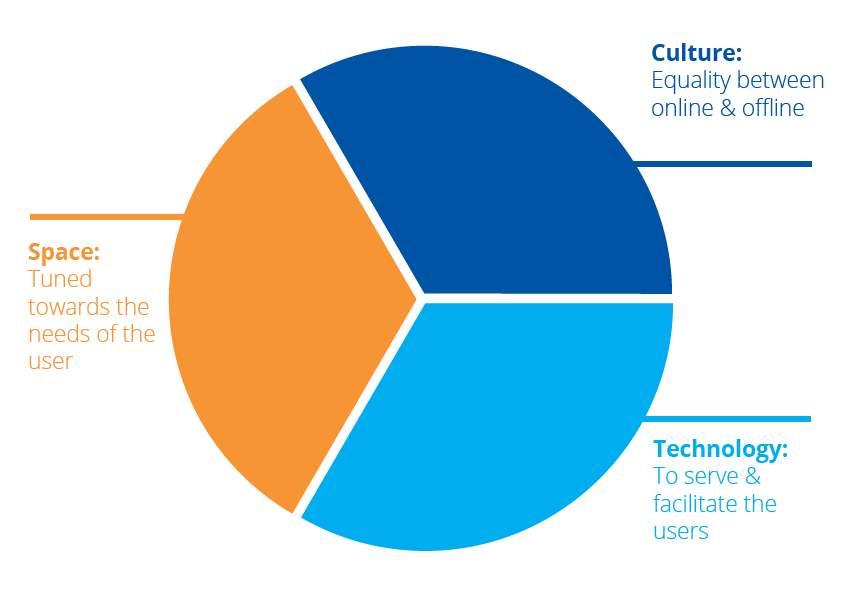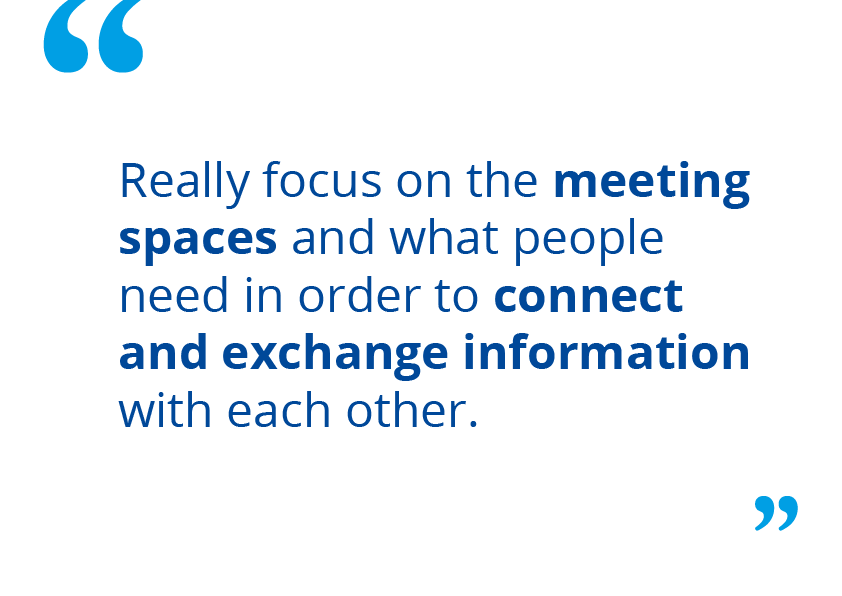
How is the COVID 19-period for somebody who’s core focus is to connect people to shape cities and future offices for large companies like Vrumona and Heineken? We have interviewed Ruben Lentz from BLOC, who describes himself as an urbanist with a passion for future-proof cities, creative processes and emerging technologies. What are his lessons learned and his hopes for the future when it comes to collaboration, hybrid working and the role of the office in the future?
Can you briefly explain what an urbanist is?
"It's actually a combination of an urban designer and an urban planner. I am really fascinated by all the processes that take place in a city, for example how the flow of money, energy and food works. My main focus is to bring people together and make sure that they join forces or invest in something together by translating certain interests and wishes into an actual plan."
In that light, how do you look back on the past 12+ months - what were the challenges and what did you learn?
"It was absolutely challenging as our core focus is to connect people. Due to COVID that suddenly stopped, which was quite a shock. Initially, my biggest fear was if we were able to continue our work to begin with. Quite soon we realised that this fear was not really justified, because working from home actually turned out to be fine. Actually, it had quite a few advantages.
Then we encountered a completely different problem, because people were becoming almost too productive. We all worked really hard on our own projects and working days became longer. Meanwhile, there is also the lack of spontaneity and serendipity, because there are no unexpected, informal encounters anymore like the small-talk near the coffee machine.
In the end, the biggest challenge actually turned out to be that we miss the non-functional connection with each other. As a reaction, we have created much more ‘togetherness’ in the company. Now we start every day with a brief stand-up together and discuss what we are working on and how we can help each other."
And personally, do you take anything positive out of it?
"Yes, really the increased level of trust. I really do believe that most people work hard, motivated by themselves. In fact, rather too hard than not hard enough. That creates a new kind of freedom to define what suits everyone best and that might not be being in a certain place from 9 to 5. In my view, the office will no longer be a place for checking if people are working, but much more a place for deliberate gathering. For example to work out ideas or getting to know each other better as a team."
Do you have any tips from your own experience on how to collaborate successfully at a distance?
"I think it's very much about being able to offer each other help and literally creating space for that. It's partly about simply making time for that, which can be a daily stand-up or a weekly meeting or just one-on-one moments. On the other hand, there is also a cultural part. I believe it is important to make it much more normal to show weaknesses. That you dare to say: 'It's really getting too much for me. Can you help me?’."
Looking at now and the future - you are working on ‘future offices’ for Heineken, Vrumona and others. What is your approach to developing a new office strategy with and for companies?
"It's a bit of an open door, but it’s really key to talk to the people who will be working there. In the past, it was very logical that the management of a company would set certain spearheads and ambitions in the field of productivity or health for example.
By asking people in the organization what they like better in their home office, you actually get a lot of relevant information. Answers are for example: 'I have better light here, I have better coffee here, I can go and do sports during the day.' People usually don't choose that ping-pong table or to stop working at 4 pm every day, but rather exercising during the day or eating more healthy meals.
In my view, you really have to ask these questions and take the answers very seriously. Of course, that is a great challenge too, because all sorts of things will come out of it. Some things are very expensive or more difficult to integrate, because they have an impact on other aspects. So you have to make choices and go back to the decision-makers in the end, but you have to start that conversation first."

After more than a year of COVID-19 and due to the unpredictable nature of the pandemic, it is of course difficult to predict the future, but what do you see as the most important factors when it comes to work, collaboration and the role of the office in the future?
"I have a great hope and a great fear. I hope that the office becomes a place where people come together. Not so much to show that they are working, but simply to connect with each other. An important precondition is that we do this properly and that concerns a healthy relationship with hybrid working. That is a major challenge. By now, everyone has installed the tools for video calls and the exchange of files and so on, but we still have to arrange hybrid working in the offices, because that creates a great deal of flexibility and freedom. The experience needs to be the same – no matter if you call in to a meeting or if you are physically present.
My prediction is - this is of course always a bit tricky with a pandemic - that once the offices reopen everyone is very happy to go back, to see colleagues again, to see the new colleagues in real life and that around Christmas people will start to ask themselves 'why am I actually here all day?' and 'why am I here five days a week?’. I think we will then pick up the good things from the current situation."

When you talk about the office of the future, you explicitly mention 'space, culture and technology'? Can you explain that?
"Space is about creating spaces that are not so much designed for individual work, the classic office, but instead creating different spaces with specific functions. That is often called activity-based working, which makes it possible to choose the space that fits your planned activity best. That means that the space is really tuned towards the needs of the users and also adaptable to a particular user.
Culture is very much about the equality between online and offline and the optimal integration of the activities. In doing so, we also address other problems that were already present in the workplace, such as discrimination. That we also ensure more equality there. That's a very complicated topic, but I do think it's a very important one.
Technology is really about technology that serves and facilitates the users. Not so much by adding more functions, but by making it more logical and by facilitating people throughout the day. It needs to be really easy to share information and connect with other people."

This activity-based office design does sound like a major investment. Let's say I was a facility manager with a limited budget in a medium-sized company and I also wanted to optimally prepare my office for the big return. What would your advice be?
"Focus on collaboration and not on the old standard of simply providing employees a desk to work at. Create some settings that are perfect for hybrid meetings. Set up a meeting room as a café and put a good coffee machine there and buy some active furniture. Really focus on the meeting spaces and what people need in order to connect and exchange information with each other."
For yourselves - what role does visualisation play in getting from idea to concept to plan? How does that work for you?
"Visualisation is a very big part. Crucial even. We are trying to move away from working in fixed, linear documents and work much more with presentations and whiteboards. Both digitally and physically. We are often at the beginning of a project when we start up the concept development. You always have to be careful how you record things. There is always the danger that you record things in detail in a document too quickly before you actually agreed on the bigger picture. That is the reason why we first start with visualising the main concept before we get down to the details."
And then the last question - is there anything else you would like to mention?
"I think the most important thing is that many people are longing to go back to the office and see each other again. Just to catch up, so to speak. Of course, you can't catch up completely, but we don't have to go back to the old situation. My advice would be that you also write down for yourself what you like about this period of time. I think that works very well."